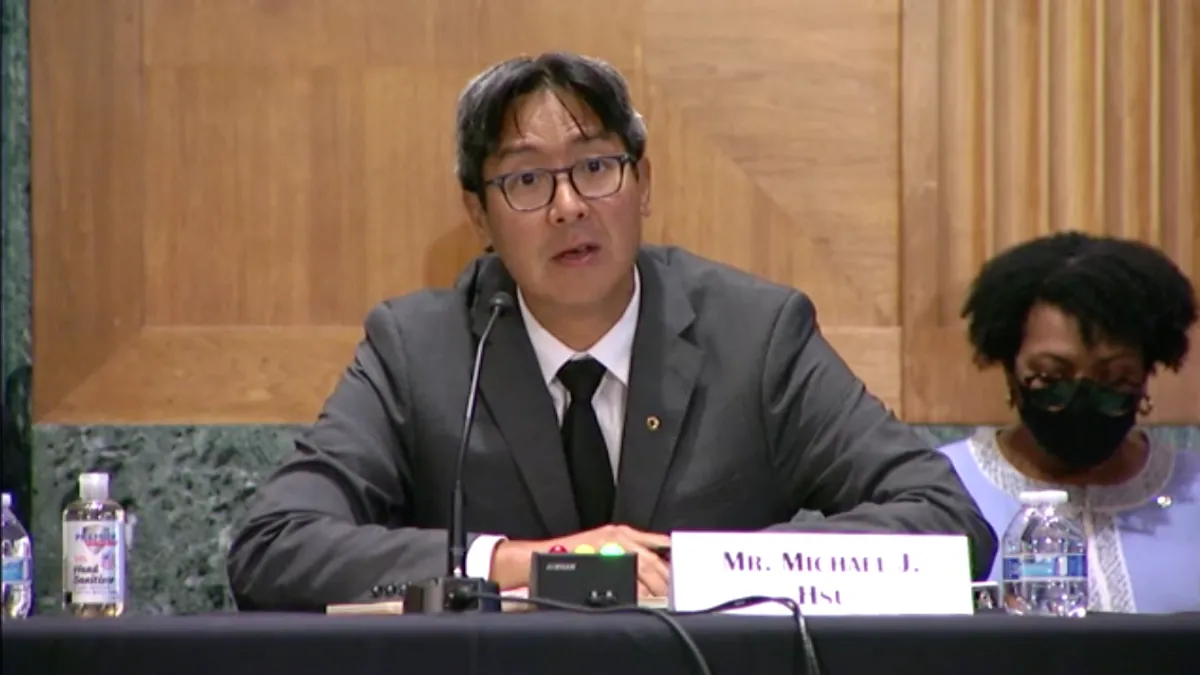Dive Brief:
- Banks whose size inhibits their abilities to address internal weaknesses and comply with regulations may need to be broken up, the acting head of the Office of the Comptroller of the Currency said Tuesday.
- The size and complexity of such “too-big-to-manage” banks can cause risk management breakdowns and negative surprises to occur too frequently, Acting Comptroller Michael Hsu said at a Brookings Institution event. “[E]ffective management is not infinitely scalable,” he said.
- Hsu said the regulator uses an escalating framework to determine whether a bank has grown to an unmanageable size, and is considering ways it can provide more transparency for the process.
Dive Insight:
The most effective and efficient way to fix issues at a too-big-to-manage bank is to simplify it — “by divesting businesses, curtailing operations and reducing complexity,” Hsu said.
Steps such as enacting senior management changes, increasing remediation budgets, developing better plans and hiring more risk personnel will have limited impact at a bank deemed too big to manage, Hsu said.
“It is the size and complexity of the bank that is the core problem that needs to be solved, not the weaknesses of its systems and processes or the unwillingness or incompetence of its senior leaders,” Hsu said.
Hsu detailed the four-level escalation framework the OCC uses to determine whether a bank has grown too large to manage and should be broken up, beginning with a firm being put on notice through a nonpublic supervisory finding.
Weaknesses that go unaddressed can escalate into public enforcement actions, such as a consent order, which, depending on the infraction, could be paired with a civil money penalty, Hsu said.
If significant deficiencies persist, a bank may be put under a growth restriction, Hsu said.
“Imposing a growth restriction is a significant escalation and must be approached with due process and proportionality in mind,” he said. “It is a step that we do not take lightly.”
Divestiture, or breaking up the bank, marks the fourth level of the OCC’s escalation framework, Hsu said, and is considered when a bank repeatedly fails to address a problem.
“It is at this stage that evidence of the bank’s inability to manage itself would become overwhelming,” he said.
Breaking up a bank that has grown beyond its ability to manage itself is a viable option, said Hsu, who noted U.S. global systemically important banks are required to identify lines of business that can be sold quickly as part of the living will process.
“This means that there are actionable divestiture options at those banks should a situation demand it, be it resolution or an enforcement action to make a [too-big-to-manage] bank manageable,” he said.
The OCC is considering steps to provide more transparency and predictability in its escalation framework, Hsu said.
“Greater clarity about the process and standards of review would support due process and fairness and bolster the credibility of supervisory actions taken,” he said. “I see significant value in working collaboratively with the other federal banking agencies as we refine our thinking.”
Hsu’s remarks regarding the OCC’s push to penalize repeat offenders echo a similar effort by the Consumer Financial Protection Bureau under Director Rohit Chopra.
Since taking the helm of the agency in 2021, Chopra has vowed to crack down on banks with a history of recurring offenses.
Wells Fargo, a bank some Democratic lawmakers and consumer rights advocates have labeled too big to manage, reached a record $3.7 billion settlement with the CFPB last month over a slew of consumer abuses related to auto loans, mortgages and deposit accounts.
Chopra, who accused the San Francisco-based bank of engaging in a “rinse-repeat cycle of violating the law,” called the bank’s remediation efforts under the settlement an important initial step for accountability and long-term reform.
Meanwhile, the firm, which is operating under an asset cap imposed by the Federal Reserve in 2018, announced last week it would scale back its mortgage lending operations, a move that, according to one of the firm’s most vocal opponents, confirms the bank is too big to manage.
“After a string of abusive practices, years of breaking the law, and another public enforcement action announced by the CFPB last month, I am not surprised that Wells Fargo has finally come to the conclusion that I arrived at long ago: Wells Fargo is too big to manage and as a result, incapable of complying with the law,” Rep. Maxine Waters, D-CA, the ranking member on the House Financial Services Committee, said in a statement last week.














